英语人教版必修三unit3导学案
人教版新课标必修三 Unit 3 单元导学案
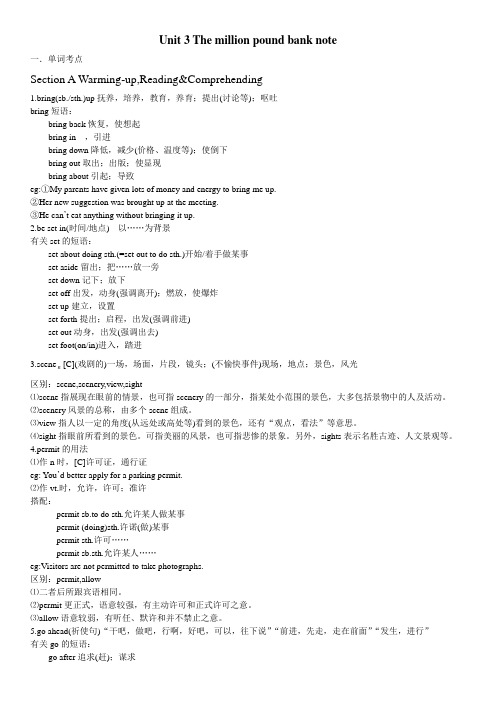
Unit 3 The million pound bank note一.单词考点Section A Warming-up,Reading&Comprehending1.bring(sb./sth.)up抚养,培养,教育,养育;提出(讨论等);呕吐bring短语:bring back恢复,使想起bring in ,引进bring down降低,减少(价格、温度等);使倒下bring out取出;出版;使显现bring about引起;导致eg:①My parents have given lots of money and energy to bring me up.②Her new suggestion was brought up at the meeting.③He can’t eat anything without bringing it up.2.be set in(时间/地点) 以……为背景有关set的短语:set about doing sth.(=set out to do sth.)开始/着手做某事set aside留出;把……放一旁set down记下;放下set off出发,动身(强调离开);燃放,使爆炸set up建立,设置set forth提出;启程,出发(强调前进)set out动身,出发(强调出去)set foot(on/in)进入,踏进[C](戏剧的)一场,场面,片段,镜头;(不愉快事件)现场,地点;景色,风光3.scenen区别:scene,scenery,view,sight⑴scene指展现在眼前的情景,也可指scenery的一部分,指某处小范围的景色,大多包括景物中的人及活动。
⑵scenery风景的总称,由多个scene组成。
⑶view指人以一定的角度(从远处或高处等)看到的景色,还有“观点,看法”等意思。
⑷sight指眼前所看到的景色。
可指美丽的风景,也可指悲惨的景象。
2020年新人教版必修三《Unit 3 Diverse Cultures》单元教案(附导学案)1
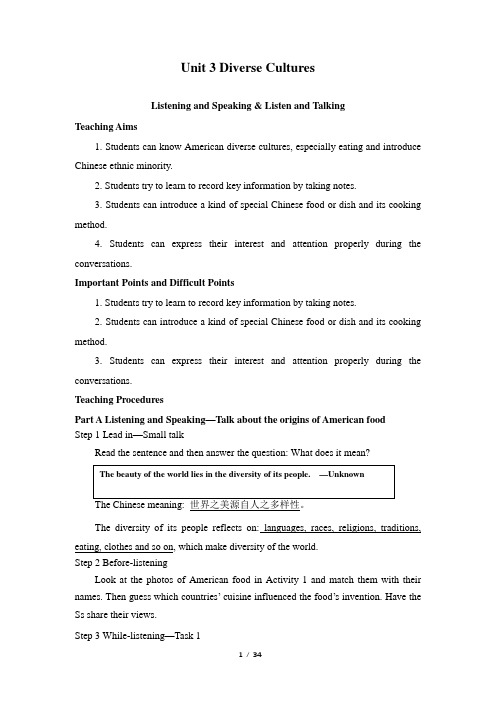
Unit 3 Diverse CulturesListening and Speaking & Listen and TalkingTeaching Aims1. Students can know American diverse cultures, especially eating and introduce Chinese ethnic minority.2. Students try to learn to record key information by taking notes.3. Students can introduce a kind of special Chinese food or dish and its cooking method.4. Students can express their interest and attention properly during the conversations.Important Points and Difficult Points1. Students try to learn to record key information by taking notes.2. Students can introduce a kind of special Chinese food or dish and its cooking method.3. Students can express their interest and attention properly during the conversations.Teaching ProceduresPart A Listening and Speaking—Talk about the origins of American foodStep 1 Lead in—Small talkRead the sentence and then answer the question: What does it mean?The Chinese meaning: 世界之美源自人之多样性。
必修三unit3导学案资料

必修三u n i t 3 导学案课型一:阅读课(warming up, pre-reading, reading andcomprehe nding)课型二:词汇课(Discovering useful words and phrases)课型三:语法课(Discovering useful structure)课型四;语言技能课(Usi ng Ian guage)课型五:写作课(Reading and writing)课型六:测试课课型一:阅读课教学内容Warming up; Pre-reading; Reading;Comprehe nding教学目标1•了解戏剧体裁的特点,学习和理解戏剧语言,尝试表演戏剧,提高文学修养和欣赏水平。
2•学习《百万英镑》的故事,了解马克吐温的生平和他的作品风格,探讨金钱和人性的关系,树立正确的价值观和人生观。
词汇:birthplace; no vel; adve nture; phrase; author; sce ne;wander; pavement; permit; ahead; stare; fault; spot; passage acco unt; seek; con trary; un believable; amount; rude; manner scream; genuine; issue; fake; bow;短语:bring up; make a bet; go ahead; by accident; stare at; acco unt for; on the con trary; take a cha nee; in rags; as for. 自主学习&合作探究自主学习1•阅读该部分内容,了解马克吐温及其作品。
2.让学生交流他们所读过的马克吐温的其他作品。
合作探究Pre-read ing讨论Pre-reading中的问题,在书上给出答案。
人教版高中英语必修三第三单元M3 Unit3 reading导学案

M3 Unit3 Diverse CulturesReading: Li Lan’s Travel JournalMotto: Find your beauty, and that of others. Share the beauty, and achieve unity. ——Fei Xiaotong 各美其美,美人之美,美美与共,天下大同。
——费孝通I. Learning aims1.Read a travel journal and know the city of San Francisco.2.Understand and think about how a city had a diverse culture.II. Learning guidance and testsLearning guidance Tests1.Lead-in Where San Francisco lies in the USA? What makes it beautiful and special?_____________________________________________________________________________2.Skimming 1.What is this text about ?A Chinese girl, Li Lan, has taken a trip to , and wrote a .2. Match the main idea with each paragraph.Para.1 A. The author was back in San Francisco again and felt very good.Para.2 B. The author visited a local museum that showed the historical changes in California.Para.3 C. The author made a brief introduction to the Mission District and told us whatshe had done there.Para.4 D. The author is going to a jazz bar tomorrow evening.Para.5 E. The author selected a Cantonese restaurant to have a meal in Chinatown.3.Scanning Choose the best answer according to the passage.( ) 1. Before I came back in San Francisco, I visited______.A. the Golden Gate BridgeB. Napa ValleyC. the Mission DistrictD. Chinatown( ) 2. When did the earthquake happen in the city of San Francisco?A. In 1906.B. In 1848.C. In 1806.D. In 1948.( ) 3. What impressed the writer first about San Francisco?A. The Redwood Forest.B. The wine country.C. The beautiful old buildings.D. The Golden Gate Bridge.( ) 4. What does the author think impressed her most in the Mission District?A. The Mission School.B. The graffiti and comic art.C. The street art.D. The mix of cultures.( )5. Why did Chinese immigrants go to San Francisco at first?A. They wanted to join the gold rush.B. They wanted to open up shops and restaurants.C. They wanted to find jobs on farms.D. They wanted to build the railway.( ) 6. Where did the writer go for dinner?A. A Cantonese restaurant.B. A jazz bar.C. A shop.D. A Mexican restaurant.( ) 7. How did the author feel about tomorrow’s tour?A. Worried.B. Excited.C. Frustrated.D. Surprised.4. Discussion What are the benefits and challenges of cultural diversity?_____________________________________________________________________________III ConsolidationLevel A Summary Today, I arrived back in San Francisco, and it feels good (1)_________ (be) back in the city again. The city succeeded in (2)_________ (rebuild) itself after the earthquake that (3)_________ (occur) in 1906, and I stayed in the Mission District, enjoying some delicious noodles mixed with cultures.In the afternoon, I headed to a local museum (4)_________ showed the historical changes in California. During the gold rush, many Chinese arrived, and some opened up shops and restaurants in Chinatown to earn a (5)_________(live). Many others worked on (6)_________ (farm), joined the gold rush, or went to build the railway that connected California to the east. The museum showed us (7)_________America was built by immigrants from (8)_________(difference) countries and cultures.In the evening, I went to Chinatown, and ate in a Cantonese restaurant that served food on (9)_________(beauty) china plates. Tomorrow evening, I’m going to (10)_________ jazz bar in the Richmond District.Level B 阅读七选五Small talk is a short conversation we have at parties, while we wait in line in a store, at family events or work. Sometimes we make small talk with people we know but not well. Often we have to make small talk with completestrangers. ______. Here are some tips to improve your ability to make small talk._______If you have seen a really good movie or have read a really good book, you can talk about that.When you are sharing the same experience with someone, it’s easy to start a conversation. You simply notice and comment on what ’s going on around you. For example, if you are at a party and a song comes on that you like or that reminds you of something, you can talk about that.Ask open -ended questions.These types of questions require more thought and more than a simple yes or no answer. _______, the conversationwill go on longer.Become a student.Nobody knows everything. So, as someone is answering one of your open -ended questions, they bring up somethingabout which you know nothing. So tell them! This lets the other person become the teacher. _______. It’s a win -winsituation.Like anything, being good at making small talk takes practice._______, you may find it easy. If you make small talkusing English, you will definitely improve your speaking and listening skills.A. Have some conversation starters ready.B. However, some people are not good at small talk.C. If you make small talk in your native language.D. If you ask questions that need more details to answer.E. You can talk about something that you recently learned.F. Many people find these small conversations about random topics easy.G. They feel good about sharing their knowledge and you get to learn something.1 2 3 4 5。
2020年新人教版必修三《Unit 3 Diverse Cultures》单元教案(附导学案)1

Unit 3 Diverse CulturesListening and Speaking & Listen and TalkingTeaching Aims1. Students can know American diverse cultures, especially eating and introduce Chinese ethnic minority.2. Students try to learn to record key information by taking notes.3. Students can introduce a kind of special Chinese food or dish and its cooking method.4. Students can express their interest and attention properly during the conversations.Important Points and Difficult Points1. Students try to learn to record key information by taking notes.2. Students can introduce a kind of special Chinese food or dish and its cooking method.3. Students can express their interest and attention properly during the conversations.Teaching ProceduresPart A Listening and Speaking—Talk about the origins of American foodStep 1 Lead in—Small talkRead the sentence and then answer the question: What does it mean?The Chinese meaning: 世界之美源自人之多样性。
人教课标必修三Unit3 词汇导学案
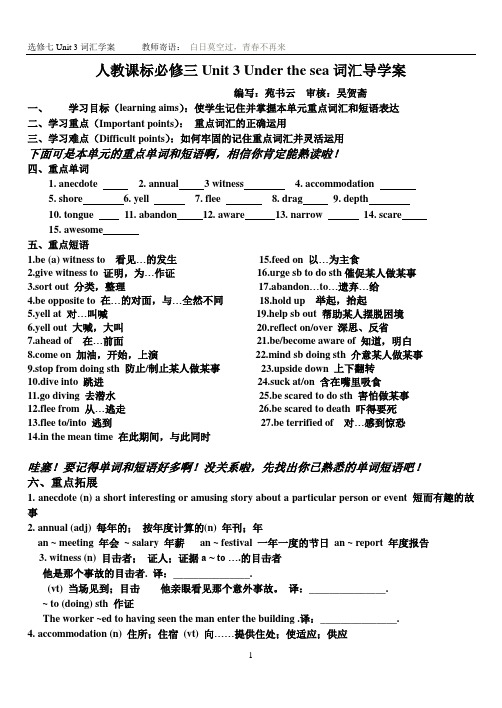
人教课标必修三Unit 3 Under the sea词汇导学案编写:苑书云审核:吴贺斋一、学习目标(learning aims):使学生记住并掌握本单元重点词汇和短语表达二、学习重点(Important points):重点词汇的正确运用三、学习难点(Difficult points):如何牢固的记住重点词汇并灵活运用下面可是本单元的重点单词和短语啊,相信你肯定能熟读啦!四、重点单词1. anecdote2. annual 3 witness 4. accommodation5. shore6. yell7. flee8. drag9. depth10. tongue 11. abandon 12. aware 13. narrow 14. scare15. awesome五、重点短语1.be (a) witness to 看见…的发生15.feed on 以…为主食2.give witness to 证明,为…作证16.urge sb to do sth催促某人做某事3.sort out 分类,整理17.abandon…to…遗弃…给4.be opposite to 在…的对面,与…全然不同18.hold up 举起,抬起5.yell at 对…叫喊19.help sb out 帮助某人摆脱困境6.yell out 大喊,大叫20.reflect on/over 深思、反省7.ahead of 在…前面21.be/become aware of 知道,明白e on 加油,开始,上演22.mind sb doing sth 介意某人做某事9.stop from doing sth 防止/制止某人做某事23.upside down 上下翻转10.dive into 跳进24.suck at/on 含在嘴里吸食11.go diving 去潜水25.be scared to do sth 害怕做某事12.flee from 从…逃走26.be scared to death 吓得要死13.flee to/into 逃到27.be terrified of 对…感到惊恐14.in the mean time 在此期间,与此同时哇塞!要记得单词和短语好多啊!没关系啦,先找出你已熟悉的单词短语吧!六、重点拓展1. anecdote (n) a short interesting or amusing story about a particular person or event 短而有趣的故事2. annual (adj) 每年的;按年度计算的(n) 年刊;年an ~ meeting 年会~ salary 年薪an ~ festival 一年一度的节日an ~ report 年度报告3. witness (n) 目击者;证人;证据a ~ to ….的目击者他是那个事故的目击者. 译:_______________.(vt) 当场见到;目击他亲眼看见那个意外事故。
人教版高中英语必修三Unit3TheMillionPoundBankNoteword导学案3
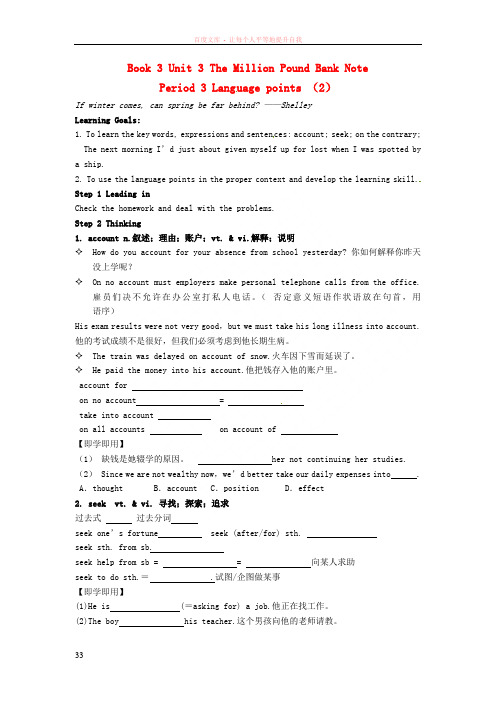
Book 3 Unit 3 The Million Pound Bank NotePeriod 3 Language points (2)If winter comes, can spring be far behind? ——ShelleyLearning Goals:1. To learn the key words, expressions and senten ces: account; seek; on the contrary; The next morning I’d just about given myself up for lost when I was spotted bya ship.2. To use the language points in the proper context and develop the learning skill. Step 1 Leading inCheck the homework and deal with the problems.Step 2 Thinking1. account n.叙述;理由;账户;vt. & vi.解释;说明✧How do you account for your absence from school yesterday? 你如何解释你昨天没上学呢?✧On no account must employers make personal telephone calls from the office.雇员们决不允许在办公室打私人电话。
(否定意义短语作状语放在句首,用语序)His exam results were not very good,but we must take his long illness into account.他的考试成绩不是很好,但我们必须考虑到他长期生病。
✧The train was delayed on account of snow.火车因下雪而延误了。
Unit3FascinatingParks课文知识点导学案高中英语人教版选择性
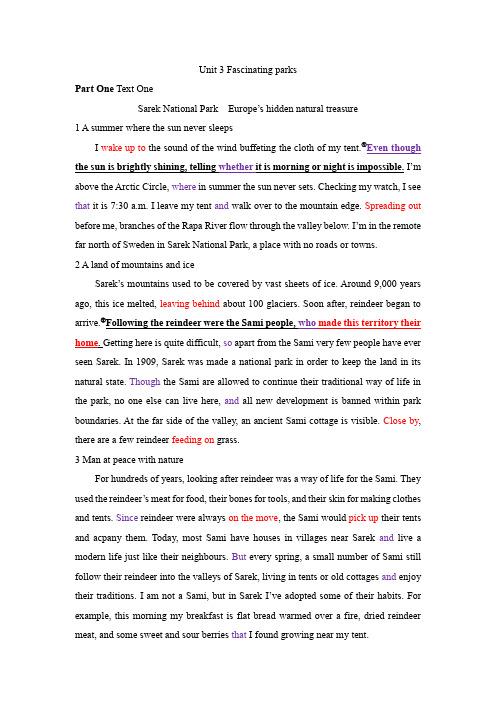
Unit 3 Fascinating parksPart One Text OneSarek National Park Europe’s hidden natural treasure1 A summer where the sun never sleepsI wake up to the sound of the wind buffeting the cloth of my tent.①Even though the sun is brightly shining, telling whether it is morning or night is impossible. I’m above the Arctic Circle, where in summer the sun never sets. Checking my watch, I see that it is 7:30 a.m. I leave my tent and walk over to the mountain edge. Spreading out before me, branches of the Rapa River flow through the valley below. I’m in the remote far north of Sweden in Sarek National Park, a place with no roads or towns.2 A land of mountains and iceSarek’s mountains used to be covered by vast sheets of ice. Around 9,000 years ago, this ice melted, leaving behind about 100 glaciers. Soon after, reindeer began to arrive.②Following the reindeer were the Sami people, who made this territory their home. Getting here is quite difficult, so apart from the Sami very few people have ever seen Sarek. In 1909, Sarek was made a national park in order to keep the land in its natural state. Though the Sami are allowed to continue their traditional way of life in the park, no one else can live here, and all new development is banned within park boundaries. At the far side of the valley, an ancient Sami cottage is visible. Close by, there are a few reindeer feeding on grass.3 Man at peace with natureFor hundreds of years, looking after reindeer was a way of life for the Sami. They used the reindeer’s meat for food, their bones for tools, and their skin for making clothes and tents. Since reindeer were always on the move, the Sami would pick up their tents and acpany them. Today, most Sami have houses in villages near Sarek and live a modern life just like their neighbours. But every spring, a small number of Sami still follow their reindeer into the valleys of Sarek, living in tents or old cottages and enjoy their traditions. I am not a Sami, but in Sarek I’ve adopted some of their habits. For example, this morning my breakfast is flat bread warmed over a fire, dried reindeer meat, and some sweet and sour berries that I found growing near my tent.4 A land of adventureAfter breakfast, I pack my bag and set out again. Since I must carry all of my food and supplies with me, my bag weighs about 30 kilograms. If today is anything like yesterday, it will be full of sweet and hard work as I hike over this difficult land to my destination on the other side of the valley. However, I cannot plain. Being in such a beautiful and wild place makes me feel blessed to be alive. Here I am, alone under this broad sky, breathing the fresh air, and enjoying this great adventure. What could be better ?知识点链接①Even though the sun is brightly shining, telling whether it is morning or night is impossible.even though引导让步状语从句1)even though相当于even if,意为“即使”2)evne if/ though引导让步状语从句,如果主句用一般将来时,从句则用一般现在时表将来,遵循“主将从现”原则[例] Even though I have a lot of work to do, I will make time for exercise.②Following the reindeer were the Sami people, who made this territory their home.完全倒装·为保持句子平衡或使上下文衔接更紧密,可把分词短语、介词短语或形容词短语提到句首,并把句子的谓语全部提到主语之前,构成完全倒装[例] Standing on the top of the mountain is an ancient building dating back hundreds of years.拓展:完全倒装的其他情况1)here, there, now, then等副词置于句首,谓语动词为be, e, go, lie, run等时,句子要完全倒装[例] Then came the great moment when the spaceship was successfully launched into space.2)表示运动方向的副词out, in, up, down, away, off等置于句首,句子要完全倒装[例] Away went the runners.3)there be句型属于完全倒装结构,该句型中be还可用appear, lie, live, sit, stand, remain, exist等动词替换[例] There once existed a powerful dynasty that ruled the country for centuries.注意:上述需要用完全倒装结构的情况中,主语必须是名词,若句子的主语是人称代词,则不能用倒装结构[例] Up she es.Part One Text TwoTheme Parks fun and more than funWhich theme park would you like to visit ? There are various kinds of theme parks, with different parks for almost everything: food, culture, science, cartoons, movies, history, and so on. Some parks are famous for having the biggest or longest roller coasters, others for showing famous sights and sounds.①Whichever and whatever you like, there is an incredible theme park that will appeal to you !The theme park you are probably most familiar with is Disneyland, which can be found in several parts of the world. Disneyland will bring you into a magical world and make your childhood dreams e true. Travelling through space, visiting a pirate ship, or meeting an adorable fairytale or cartoon character are all possible at Disneyland. As you wander around the fantasy amusement park, you may see Snow White or Mickey Mouse in a parade or even on the street. Of course, Disneyland also has many exciting rides to amuse you, from enormous swinging ships to scary freeall drops. If you want to have fun and more that fun, e to Disneyland !Dollywood, in the beautiful Smoky Mountains in southeastern USA, is unique because it shows and celebrates America’s traditional southeastern culture. Famous country music groups put on performances there all year round, indoors and outdoors. People e from all over America to see skilled workers make wood, grass, and iron objects in the oldfashioned way. Visiting the candy shop and trying some of the same kind of candy that American southerners made 150 years ago is a rare experience. Riding on the only steam engine still working in the southeastern United States is a special treat. And for those who like rides, Dollywood has a superb old wooden roller coaster, Thunderhead. It is worldfamous for having the longest track in the smallest space. e to Dollywood to have fun learning all about America’s historical southeastern culture !Chimelong Ocean Kingdom in Zhuhai, China, is one of the leading oceanthemed parks in the world. Here you can walk under the Whale Shark Aquarium — the world’s largest —and see up to 20, 000 fish, in addition to whale sharks. Watching the dolphin and sea lion shows is both educational and fun. Of course, you can also see all kinds ofinteresting animals, including polar bears. The park has more rides than you can imagine: join a water fight against pirates, get turned upside down by an exciting roller coaster, or get wet in one of the water rides ! Then at night, see the splendid Journey of Lights Parade and fireworks display. Hungry ?②The park has plenty of restaurants with tasty food for every appetite — you can even eat while watching the fish swim by.If it is ocean entertainment that you are looking for, e to Chimelong Ocean Kingdom !知识点链接①Whichever and whatever you like, there is an incredible theme park that will appeal to you !whichever和whatever引导让步状语从句1)whichever和whatever两者的区别:whichever是在某范围内做出选择;whatever 没有范围限制[例] It takes three hours, whichever route you take.Whatever decision he makes, I will support it.2)whichever和whatever还可引导名词性从句,在从句中作主语、宾语、表语、定语等[例] Whichever of you gets here first will get the prize.②The park has plenty of restaurants with tasty food for every appetite — you can even eat while watching the fish swim by.“while + 现在分词”构成的省略句1)当时间、条件、让步、方式等状语从句的主语与主句主语一致,或从句主语是it,且从句谓语含有be动词时,可以把从句主语和be动词省略[例] Although/ Though (she was) surprised at the result, Jane didn’t say anything. 2)状语从句省略后的结构:连词+ 现在分词/过去分词/介词短语/副词/形容词[例] Unless invited, I won’t attend his wedding to be held next month.Part Two Key Word1. buffet vt. 连续猛击;打来打去n. 自助餐2. cloth n.(一块)布;织物;布料3. edge1)n.边;边缘;刀刃_______________ 在…边缘_______________ 濒临灭绝_______________ 极为激动_______________(不愉快的事情)使…发狂2)vt. & vi.(使)徐徐移动;给…加边_______________ 用…镶边4. valley n. 山谷;溪谷5. vast adj.辽阔的;巨大的;庞大的6. glacier n.冰川7. reindeer n. 驯鹿8. territory n.领土;版图;领域9. ban1)vt. 明令禁止;取缔_______________ 禁止(做)某事_______________ 禁止某人(做)某事[拓展] 近义词_____________________________________________2)n.禁令_______________ 对…的禁令_______________ 实施/解除(对…的)禁令10. boundary n. 边界;界限;分界线11. cottage n.小屋;(尤指)村舍;小别墅12. visible adj.可见的;看得见的13. on the move 在行进中;在移动中[拓展]“on the + n.”________________(电视、广播)正在播送________________ 在上班时;在干活时;在工作岗位上________________ 在增加;在上涨________________ 忙碌;不停地奔波;逃避14. acpany1)vt.陪同,陪伴_______________ 陪某人去…_______________ 在…的陪同下2)vt.伴随,与…同时发生3)vt.(尤指用钢琴)为…伴奏_______________ 用钢琴为某人伴奏[拓展] 同根词_______________ n. 伙伴,同伴_______________ n.陪伴;公司_______________ 陪伴某人15. adopt1)vt.采用;采取;采纳2)vt. & vi.领养[拓展] 同根词_______________ adj.收养的,领养的_______________ n.收养,领养16. sour adj. 酸的;有酸味的17. set out1)出发,动身(= set off)_______________ 动身去某处2)(怀着目标)开始工作,展开任务_______________ 开始做某事_______________[拓展] set_______________ 出发,动身;使(炸弹)爆炸;引发_______________ 设立,建起;创建_______________ 写下,记下_______________ 把…放到一旁;省出,留出(时间或钱)_______________(尤指不愉快的事件)开始,来临_______________ 进入,访问,参观(某地)18. bless vt. 祝福19. live off1)靠…过活,依赖…生活2)以吃…为生(= live on或feed on)[拓展] live_______________ 过着…的生活_______________ 忍受,容忍(不快的事)_______________ 靠做某事赚钱为生(或获取所需)_______________ 达到,符合,不辜负(他人的期望)_______________ 继续存在,继续活着;靠(…钱)生活;以吃…为生_______________ 经历(灾难或其他困境)而幸存20. prohibition n.禁止;阻止;禁令_______________ 一项对…的禁令21. prohibit vt.(尤指以法令)禁止_______________ 禁止做某事_______________ 阻止某人做某事22. journalist n. 新闻记者;新闻工作者23. sneeze vi.打喷嚏n. 喷嚏;喷嚏声24. teapot n.茶壶25. label vt.用标签标明;贴标签n. 标签;标记26. cream n. 奶油;乳脂;护肤霜adj. 奶油色的;淡黄色的27. leopard n.豹28. stretch vi.延伸;延续vi. & vt.伸展;舒展29. rewarding adj.值得做的;有益的[拓展] reward1)n. 奖励,回报,报酬;悬赏金_______________ 作为(对…的)报答_______________ 为某事给某人奖励2)vt.奖励;奖赏;给以报酬_______________ 用某物回报或奖励某人_______________ 因为(做)某事而奖励某人30. bush n.灌木31. lung n. 肺32. cycle n. 自行车;摩托车;循环vi. 骑自行车33. pedal n.(自行车等的)脚蹬子;踏板vt. & vi. 骑自行车;踩踏板34. fountain n.喷泉;人工喷泉;喷水池35. route n. 路线;路径;途径36. ahead adv.向前;在前面;提前37. theme n.主题;主题思想adj. 有特定主题的38. theme park 主题公园39. roller coaster 过山车40. incredible adj.难以置信的;极好的;极大的41. appeal1)vi.有吸引力;呼吁;恳求;上诉_______________ 对… 有吸引力;有感染力;呼吁;上诉;打动_______________ 呼吁某人做某事_______________(向某人)呼吁某事2)n. 吸引力;呼吁;上诉;请求_______________ 呼吁某人做某事_______________ 向某人呼吁某事_______________ 对某人没有吸引力[拓展] 同根词_______________ adj. 有吸引力的,有感染力的,令人感兴趣的42. appeal to 有吸引力;有感染力;呼吁;上诉;打动43. pirate n. 海盗;盗版者vt. 盗印;窃用44. adorable adj. 可爱的;讨人喜爱的45. wander1)vt. & vi.闲逛;漫游;游荡_______________ 四处闲逛2)n. 闲逛;漫游_______________ 闲逛3)vi. 走失;离散;走神;(思想)开小差_______________ 迷失;离开正途或正确的方向_______________ 跑题_______________ 分散某人的注意力/让某人思想开小差46. amusement n.娱乐(活动);愉悦_______________ 令某人感到(极)好笑的是47. amuse vt.(提供)消遣;(使)娱乐_______________(通过做某事)逗笑某人/自娱自乐_______________ 做某事使某人笑起来[拓展] 同根词_______________ adj.觉得好笑的_______________ 被…逗乐_______________ 做某事而感到好笑_______________ adj.有趣的48. enormous adj.巨大的;极大的49. swing vt. & vi.(使)摆动;摇摆;转弯;(使)突然转向50. iron n. 铁;铁器;铸铁;熨斗vt. & vi.(用熨斗)熨;烫平51. fashion n. 时尚;时兴;流行款式52. rare adj.稀少的;珍贵的;(肉)半熟的53. steam n. 蒸汽;水蒸气;蒸汽动力vi.蒸发;散发蒸汽;冒水汽54. superb adj.极佳的;卓越的55. aquarium n.水族馆;水族玻璃槽;养鱼缸56. up to1)达到(某数量、程度等)[例] UNESCO will provide limited insurance coverage up to USD 30,000 for the internship period.2)直到(相当于till或until)[例] Please feel free to call me any time up to half past nine at night.3)(体力或智力上)能胜任[例] I’m afraid Tim just isn’t up to the job.4)是(某人)的责任,由…决定,取决于[例] Life is disappointing at times, but it is up to you to make yourself happy.57. polar adj.(近)极地的;南极(或北极)的;磁极的58. upside down 颠倒;倒转;翻转_______________ 把…翻得乱七八糟;给(某人生活)造成大的变化(或混乱)59. splendid adj. 壮丽的;雄伟的;极佳的;非常好的60. display1)n. 展览;陈列;展览品_______________ 在展览中,在展出2)vt. 显示;陈列_______________ 向某人展示某物61. appetite n.食欲;胃口;强烈欲望_______________ 胃口好/胃口不好/没有胃口_______________ 增进食欲_______________ 对…提起胃口_______________ 破坏食欲;影响胃口_______________ 失去胃口_______________ 对…有强烈欲望62. entertainment n.娱乐;招待;娱乐活动;文娱节目[拓展] 同根词_______________ v.娱乐,招待_______________ 用…使某人快乐_______________ 用某物招待/款待某人_______________ adj.令人愉快的;有趣的_______________ n.表演者,艺人63. column n.(书、报纸印刷页上的)栏;专栏;柱(形物)。
人教版高中英语必修第3册 Unit3 Reading for writing导学案

3.学习准备:
准备好必修三课本和笔记本。
4.学习方式和环节:
按老师指令完成相应的课上练习,学习环节主要有:
了解学习目标,引入话题进入文本阅读。阅读标题,预测本文的目标读者和作者的写作目的 第一遍阅读,验证预测,找出体现作者写作目的的句子 第二遍阅读回答两个问题,教师提供相应的背景知识第三遍阅读,分析文章的结构和语言特点通过头脑风暴,列出自己的文章的大纲教师向学生提供可用的表达,学生进行写作阅读例文,借鉴其中好的内容和语言,学生再次修改自己的文章。
导学案
1.课题名称:
人教版高一必修三英语——Unit3Reading for writing
2.学习目标:Leabharlann In this class, you will:
1. Acquire the information about Chinatown
2. Analyze the organization and language features of the introduction to the Chinatown
高中英语必修3 Unit 3 导学案

Unit 3 The Million Pound Bank NotePeriod4 Using Language 导学案.Knowledge Aims:1. Learn more about the story by reading the passage Act 1, Scene 4 of The Million Pound Bank Note2. Appreciate the well-known classical play by Mark Twain..Words and phrases:amount, take a chance, rude, manner, scream, genuine, rag, in rags,indeed, as for, bow.Learning Procedures:1. Write down the words according to the English explanations.a thick slice of good quality beef ________________eat food very quickly __________________real _____________ order or book ______________give a long piercing cry ______________false, not real ________________2. Fast-readingRead the text quickly and then decide which of them are true or false.(1)The owner looked down upon Henry when he noticed Henry’s appearance. ( )(2)Henry asked for more of the same food because he is an American who likes to eat a lot. ( )(3)When Henry saw the million pound bank note, he was happy and proud of it.( )(4)The owner didn’t believe that the bank note was real and he asked Henry to get out of the restaurant. ( )3. Careful-readingRead the passage carefully and answer the following questions.(1) What did the hostess feel when Henry came into the restaurant? How do you know?______________________________________________________________(2) How about Henry’s feeling after he finished eating and asked another one?________________________________________________________________(3) Why were the owner and hostess shocked when they saw the million pound bank notein Henry’s hand?_________________________________________________________(4) What made them trust that the bank note was genuine?_________________________________________________________(5) What can we learn from this story?_________________________________________________________Questions: _____________________________________4. Choose the best words to describe restaurant owner’s attitudes towards Henry.________________A. sympatheticB. flatteringC. unfriendlyD. respectful. Language points(1) reserve v.保留,预定reserve sth (for sb/sth) 为…保留These seats _______ _______ ______ special ________.★这些座位是留给贵宾的。
英语人教版必修三unit3导学案

Unit 3 The Million Pound Bank Note年级:高一科组:英语科命题人:陈冬冬一、Analysis of the teaching material and the learnersThe topic of this unit is a short story by the American author Mark Twain. It is the two rich brothers Roderick and Oliver have made a bet, about a man who could survive a month in London with million pound bank note.The students are second-grade students of senior high school.some of them are low foundation of reading English.二、Teaching aims(1)Knowledge aims:Enable the students to understand the details about the whole scene and sum up the main idea of Act 1,Scene3.Get the students to read the play.(2)Ability aims:Develop students ’s reading skills and enable them to learn how to use different reading strategies to read different reading materials.(3)Emotional aims:Stimulate students’ interest of learning English by reading and acting this play.Develop students’ sense of group cooperation and teamwork.三、Important points and difficult pointsEnable students to understand the details about the whole scene and act out the play.Enable students to learn to use reading strategies such as skimming, scanning, and so on.四、Teaching procedures【Review】Ⅰ.Match the word with its meaning.birthplace A.小说Novel B.信封Adventure C.出生地Author D.奇遇;冒险Scene E.探索;寻求wander F.著者;作家Permit G.耐性;忍耐Fault H.漫游;漫步;漂泊Spot I.过错;缺点;故障Seek J.发现;认出;斑点Patience K.许可;允许;通行证;执照Envelope L.(戏剧)一场;现场;场面;景色Ⅱ.write down the meaning of the phrases in each sentence.1.The Smiths are praised for the way they bring up their children. (抚养)2.Go ahead for two blocks,then turn left. (前进)3.I found the key by accident when I was cleaning the room. (偶然)4.In the West people think it’s rude to stare at a person. (盯着看)5.Good luck accounts for her being famous overnight. (解释)6.It doesn’t seen ugly to me;on the contrary, I think it’s rather beautiful. ( 相反)Step1 Leading inQ1: Do you like movies?Q2 :Which movies is the picture standing for?(图略)Step2 While—ReadingTask1:【Scanning】Read the narrator together and try to find the 4“W”.(P1) (1)When:(2)Where:(3)What:(4)Who:Task2:【skimming 】1.listen to the tape,underline the words you have heard and tell me what are they.(主要人物关系思维导图)(line28-34)2.Summarize the backgroundHenry was an ___①___.One day he had an accident in a ②_ _.Luckily he was survive by a ship for ③.He arrived in London by earning his passage without pay,He was ④in the street .To his surprise,an incredible thing happened.Two ⑤brothers gave him a million pound bank-note because they had made a ⑥.Task3:1.Role play(line41-56)2.Others think and discuss the following questions(1)What do you think of Henry and the two brothers?㈠For Henry:“well, it may seen luck to you but not to me”“If this is your idea of some kind of joke,I don’t think it’s very funny”“Now,if you’ll excuse me, I think I’ll be on my way”( direct/frank )“I do not want your charity.I just want an honest job”(hard-working ) ㈡The two brothersRich:Naughty :Good judges of a man:Step3 Conclusion:Put the following event in correct order:A、Henry wandered in London streets.B、About a month ago Henry Adams was sailing out of the bay.C、The next morning he was spotted by a ship.D、Towards nightfall he found himself carried out to sea by a strong wind.E、On the ship he earned his passage by working as an unpaid hand.。
新人教必修三 unit 3 Diverse Cultures全单元导学案(4份)高中英语

普通高中英语(2019版)必修第三册Unit 3 Diverse Cultures 导学案Period 1 Listening and speaking1.掌握听录音时记笔记的方法与技巧,理解听力材料的逻辑(包括表达转折、对比、因果、顺承、举例),从而确定关键信息;2.能够通过听一段访谈对话来了解美国多元文化在饮食方面的体现,并能在听力过程中记录关键信息;3.能清晰地向同伴介绍一种中国民族食品的特点和烹饪方法;4.掌握长句中意群划分的原则,能够在朗读长句或口头表达时合理运用停顿技巧。
学习重点1.能够通过听一段访谈对话来了解美国多元文化在饮食方面的体现,并能在听力过程中记录关键信息;2.能够清晰地向同伴介绍一种中国民族食品的特点和烹饪方法。
学习难点1.能清晰地向同伴介绍一种中国民族食品的特点和烹饪方法;2.掌握长句中意群划分的原则,能够在朗读长句或口头表达时合理运用停顿技巧。
Step 1 课前预习1.西式菜单(Western menu):1)pasta__________2)maple syrup_________3) fish and chips__________4)curry________5) black bean salad6) pudding________7)blue cheese_________8) haggis_________9) fried spider_________10)roast beef 11)三明治_____________12) 汉堡______________2.中式菜单(Chinese menu)1)点心_________2) 火锅_________3)饺子________4) dazhaxie__________5)北京烤鸭______________6) 鸡爪___________7) Gong Bao Chicken___________8)熏肉___________9)米饭_________10)乌龙茶__________3.识记生词1)diversity_______2)fortune_______ 3)gumbo_______ 4)nachos_______ 5)chip_______6)spicy_______ 7)ethnic_______ 8)accessory_______ 9)souvenir_______ 10)recipe_______ Step 2 Lead inRead the news report and answer these questions.Overseas Students Experience Diverse Cultures at Shandong University Shandong University in Jinan, East China's Shandong Province unveiled its I8th International Cultural Festival at its central campus on April 26, offering locals a chance to experience unique cultures from 25 countries around the world.Overseas students from Russia, France, Thailand, Afghanistan, Italy, Uganda, and Laos wore traditional costumes as they showcased food,dances,handcrafts,and souvenirs from their home countries.Since 2001, the international cultural event has evolved into an important channel the university to promote its campus culture featuring understanding, inclusiveness.for openness, and progress.①What was the purpose of holding the International Cultural Festival?_________________________________________________________________________②How did overseas students celebrate the festival on the day?_________________________________________________________________________③What feature does the International Cultural Festival embody?_________________________________________________________________________Step 3 Watching and talkingLook at the picture on page 25 and answer the questions:①Where do you think this photo was taken?_________________________________________________________________________②What can you see in the picture?How would you describe it?_________________________________________________________________________③What are some topics you will read about/ listen to in this unit?_________________________________________________________________________④What do you expect to learn from this unit?_________________________________________________________________________⑤What is the meaning of diverse cultures?_________________________________________________________________________Step 4 ListeningListen carefully and complete the sentences:①He’s here to talk about ________ on American food.②You mean there was ________ ? Food from overseas changed when it arrived in the States.③And there are many more examples of ________ dishes.④So they’re like ________ the Chinese, American, and Japanese cultures.⑤It was invented in New Orleans over 200 years ago, and ________ French, African, NativeAmerican, and Spanish cooking.⑥So it's the food of many different cultures, ________?⑦American cooking often _______ things from around the world to make something completelynew.Step 5 SpeakingListen to the conversation again and talk about the American food.American food mixes things ①__________________________________.Some recipes weren’t invented ②_____________________________.For example, the recipe for the meat in a hamburger③_____________________________,but the final hamburger was definitely created by ④_____________________.Food from overseas changed ⑤_____________________________.The fortune cookie was a mix of the ⑥________________. The gumbo was invented in ⑦_______ ___________________,and mixed ⑧_____________________________and⑨__________ ___________________.So American food is the food of ⑩_____________________________.【参考答案】Step 1 课前预习1.1)意大利面食;2)枫糖浆;3)鱼和薯片;4)咖哩;5)黑豆沙拉;6)布丁;7)蓝纹奶酪;8)肉馅香肠;9)油炸蜘蛛;10)烤牛排;11)sandwich; 12)hamburg2. 1)dim sum; 2)hot pot; 3)dumplings; 4)大炸蟹;5)Beijing duck; 6)chicken feet; 7)宫宝鸡丁;8)bacon;9)rice; 10)oolong tea3. 1)差异(性),不同(点)2)机会,运气3)秋葵汤4)墨西哥玉米5)炸土豆条6)有加香料的,辛辣的7)具有民族特色的8)配饰,附件9)纪念物,纪念品10)食谱,处方,配方Step 2①To offer locals a chance to experience unique cultures from 25 countries around the world./Topromote its campus culture featuring understanding, inclusiveness.for openness, and progress.②They wore traditional costumes as they showcased food,dances,handcrafts,and souvenirs from theirhome countries.③It was featuring understanding, inclusiveness.for openness, and progress.Step 3①The photo was probably taken in the United States because I can see a sign that says“ CALIFORNIA”. Many of the signs and decorations look Chinese, so it,s probably a Chinatown.②I can see some restaurants and stores.The signs are in Chinese and English.There is a lamp postdecorated with dragons, and also lots of red lanterns.It seems like the photo was taken at night on a busy street in Chinatown.③About cultural diversity in this world.④We will learn about cultures and how they shape people.⑤It means the coexistence of many different types of cultures in a specific region or in the world as awhole. Each culture has its distinct features and each other’s differences are respected.Step 4①cultural influences;②a mixing of cultures;③mixed-culture;④a mix of;⑤mixes;⑥all in onedish;⑦mixesStep 5①from around the world to make something completely new;②by Americans;③may have comefrom Germany;④Americans;⑤when it arrived in the States;⑥Chinese,American and Japanese cultures;⑦New Orleans over 200 years ago;⑧French,African,Native American;⑨Spanish cooking;⑩many different culturesUnit 3 Diverse CulturesPeriod 2 Reading and Thinking导学案1. Fast reading to get the detailed information according the timeline; careful reading to classify andorganise information by drawing a diagram2. Learn the reading skills--finding the timeline and drawing a diagram to classify and organiseinformation.3. Know and understand the features and reasons of diverse cultures.4. Critical think the reasons, advantages and disadvantages of diverse cultures.1. Learn the reading skills--finding the timeline and drawing a diagram to classify and organiseinformation.2. Know and understand the features and reasons of diverse cultures.Step 1 Lead in---Small talkUnit 1, we went on many festival travel, today let’s go a culture trip. Find San Francisco on the map and discuss this question in groups:What do you know and want to know about the city?Step 2 Before reading---Predict the contentFormat: __________The heroin: _________Where she visit: visit ______________Therefore, we can know the article is about _____________________________________________________________________________________________. So it may be a_____________Step 3 While reading --- Task 1Read the text and answer the following questions.Q1: Where has she been to and which does she plan to visit ?(the captalised words)Q2: When did the earthquake happen in the city of San Francisco ?Q3: Why did Chinese immigrants (移民)go to San Francisco ?Q4: Where did Li Yan go for dinner?Q5: How is the article organized ?Step 4 While reading --- Task 2 Step 4 While reading --- Task 2Read the text again and complete the timeline of Li Lan’s trip.Step 5 While reading ---Task 3Answer the questions using information from the travel journal.Classify and organize informationWe can better understand a passage by classifying or organising the information, e.g. dates, numbers, opinions. Organising means putting things in order, e.g. according to how old, how much, what kind. Sometimes it is a good idea to draw a diagram to organise the information in the passage.Before coming to San Franciscoafternoon morningtomorroweveningQ1: What impressed the writer first about San Francisco ?Q2: What is so special about the Mission District ?Q3: What examples of ethnic diversity can you find in the journal ?Step 6 Post reading ---Critical thinkingDiscuss these questions in groups.Q1: Have you ever been to a place that has a diverse culture ? What do you think about the culture diversity ?Q2: What are the benefits and challenges of cultural diversity ?The benefits:The challenges:Step 7 Post reading---RetellComplete the passage according to the text.Today, I arrived back in San Francisco, and it feels good (1) _____(be) back in the city again. The city succeeded in (2)_________ (rebuild) itself after the earthquake that (3)________ (occur) in 1906, and I stayed in the Mission District, enjoying some delicious noodles mixed with cultures.In the afternoon, I headed to a local museum (4)____ showed the historical changes in California. During the gold rush, many Chinese arrived, and some opened up shops and restaurants in Chinatown to earn a (5)_____ (live). Many others worked on (6)______ (farm), joined the gold rush, or went to build the railway that connected California to the east. The museum showed us (7)____ America was built by immigrants from (8)________ (difference) countries and cultures.In the evening, I went to Chinatown, and ate in a Cantonese restaurant that served food on (9)________(beauty) china plates. Tomorrow evening, I’m going to (10)__ jazz bar in the Richmond District.Step 8 HomeworkReview what you have learned today and fill in the table.答案:Step 1 Lead in---Small talkUnit 1, we went on many festival travel, today let’s go a culture trip. Find San Francisco on the map and discuss this question in groups:What do you know and want to know about the city?San Francisco is a city in California on the West Coast of the US. It is famous for its Chinatown andits sports teams. Besides, it is one of the wealthiest cities in the US by average income, and is often considered one of the best cities in the world to live in.Step 2 Before reading---Predict the contentFormat: dairyThe heroin: Li LanWhere she visit: visit San Francisco, USTherefore, we can know the article is about Li Lan recorded what she saw, heard, did and felt in her dairy after visiting San Francisco, US. So it may be a travel journal.Step 3 While reading --- Task 1Read the text and answer the following questions.Q1: Where has she been to and which does she plan to visit ?(the captalised words)Has been to: Redwood Forest, Napa Valley, Mission District, the Golden Bridge, a local museum, ChinatownPlan to visit: Richmond DistrictQ2: When did the earthquake happen in the city of San Francisco ?In 1906Q3: Why did Chinese immigrants(移民)go to San Francisco ?To seek their fortune in the gold rush.Q4: Where did Li Yan go for dinner?A Cantonese restaurantQ5: How is the article organized ?Time order/Timeline(morning, afternoon, evening and tomorrow)Step 4 While reading --- Task 2Read the text again and complete the timeline of Li Lan’s trip.Classify and organize informationWe can better understand a passage by classifying or organising the information, e.g.dates, numbers, opinions. Organising means putting things in order, e.g. according tohow old, how much, what kind. Sometimes it is a good idea to draw a diagram toorganise the information in the passage.Before coming to San FranciscoCamped in the RedwoodForsest;Visited Napa Valley and theGolden BridgeStep 5 While reading ---Task 3Answer the questions using information from the travel journal.Q1: What impressed the writer first about San Francisco ?The beautiful old buildings, many sitting on top of big hills. Q2: What is so special about the Mission District ?The Mission District is a vibrant, historical area full of culture and life. Q3: What examples of ethnic diversity can you find in the journal ?The Mission District which is full of people from Mexico or Central America; Mexican -Chinese noodles from a food truck; Chinatown.Step 6 Post reading ---Critical thinkingDiscuss these questions in groups.Q1: Have you ever been to a place that has a diverse culture ? What do you think about the culture diversity ?One culturally diverse place that I have been to is Harbin, the capital city of Heilongjiang Province. I went there last year with my family to see the Ice and Snow Festival, and I was amazed at how the culture as different to most other Chinese cities. There is a big Russian influence there, with beautiful Russian architecture and lots of interesting restaurants. I learnt that Harbin is called “the Oriental Moscow” and that many Russians settled there to help build the railway over 100 years ago. Q2: What are the benefits and challenges of cultural diversity ?The benefits: People are able to experience a wide variety of cultures, making their lives more interesting, and it can deepen the feelings for our national culture, it is also helpful for us to learn about other outstanding culture, which helps improve the ability to respect others.The challenges: People may have trouble communicating or understanding each other, and it may lead to disappearance of some civilizations and even make some people think “The western moon is rounder than his own.”Went to ahistorical museum.afternoon Explored the neighbourhood; learnt about Mission School art; ate Mexican -Chinese noodles from a food truck morning Will go to a jazz bar in the Richmond Districttomorrow Went to Chinatown to enjoy some home style cookingeveningStep 7 Post reading---RetellComplete the passage according to the text.Today, I arrived back in San Francisco, and it feels good (1) _____(be) back in the city again. The city succeeded in (2)_________ (rebuild) itself after the earthquake that (3)________ (occur) in 1906, and I stayed in the Mission District, enjoying some delicious noodles mixed with cultures.In the afternoon, I headed to a local museum (4)____ showed the historical changes in California. During the gold rush, many Chinese arrived, and some opened up shops and restaurants in Chinatown to earn a (5)_____ (live). Many others worked on (6)______ (farm), joined the gold rush, or went to build the railway that connected California to the east. The museum showed us (7)____ America was built by immigrants from (8)________ (difference) countries and cultures.In the evening, I went to Chinatown, and ate in a Cantonese restaurant that served food on (9)________(beauty) china plates. Tomorrow evening, I’m going to (10)__ jazz bar in the Richmond District.答案:1. to be 2. rebuilding 3. occurred 4. that 5.living6. farms7.how8. different9. beautiful10. aStep 8 HomeworkReview what you have learned today and fill in the table.Unit 3 Diverse CulturesPeriod 3 Discovering Useful Structure导学案1.Learn the definition, structure, functions and features of ellipsis.2.Learn to summarize some common ellipsis3. Learn to use ellipsis in oral and writing English.1.Learn the definition, structure, functions and features of ellipsis.2.Learn to summarize some common ellipsis3. Learn to use ellipsis in oral and writing English.Step 1 Definition of EllipsisRead the following sentences and find the words that have been omitted to avoid repetition.1.A: Oh, I just love nachos! Mexican corn chips covered in cheese!B: Me, too.A: Oh, I just love nachos! __________ Mexican corn chips covered in cheese!(省略______和______)B: Me(=_______________), too.(省略______、______和______)2.A: So it’s the food of many different cultures, all in one dish?B: Exactly.A: So it’s the food of many different cultures, _____________all in one dish?(省略______和______)B: Exactly, ___________________________________________________________.(省略______)3.A real mix of cultures here!__________ a real mix of cultures here!(省略______和______)4.Can’t wait !_______ Can’t wait __________!(省略______)(省略________)Summary:省略(Ellipsis)就是___________________________________________________________。
高一英语人教版必修三Unit3 The Million Pound Bank Note 词汇导学案设
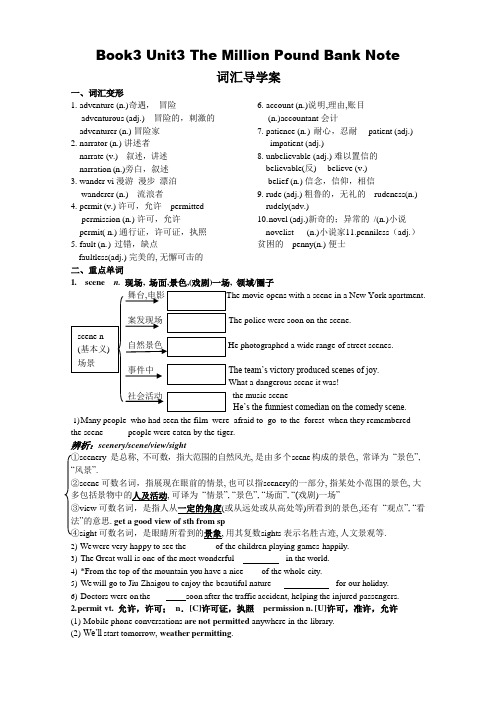
Book3 Unit3 The Million Pound Bank Note词汇导学案一、词汇变形 1. adventure (n.)奇遇, 冒险 --- adventurous (adj.) 冒险的,刺激的 ---adventurer (n.) 冒险家 2. narrator (n.) 讲述者---narrate (v.) 叙述,讲述---narration (n.)旁白,叙述3. wander vi 漫游 漫步 漂泊--- wanderer (n.) 流浪者4. permit (v.) 许可,允许---permitted--- permission (n.) 许可,允许---permit( n.) 通行证,许可证,执照5. fault (n.) 过错,缺点-- faultless(adj.) 完美的, 无懈可击的二、重点单词6. account (n.)说明,理由,账目 --- (n.)accountant 会计7. patience (n.) 耐心,忍耐--- patient (adj.)---impatient (adj.) 8. unbelievable (adj.) 难以置信的 ---believable(反)--- believe (v.) --- belief (n.) 信念,信仰,相信 9. rude (adj.) 粗鲁的,无礼的---rudeness(n.) ---rudely(adv.) 10. n ovel (adj.)新奇的;异常的 /(n.)小说 ---novelist (n.)小说家11.penniless (adj.)贫困的---penny(n.) 便士 1. scene n. 现场, 场面,景色,(戏剧)一场, 领域/圈子The police were soon on the scene.He photographed a wide range of street scenes.The team’s victory produced scenes of joy. What a dangerous scene it was! the music scene He’s the funniest comedian on the comedy scene.1) Many people who had seen the film were afraid to go to the forest when they remembered the scene ___ _ people were eaten by the tiger. 辨析:scenery/scene/view/sight①scenery 是总称, 不可数,指大范围的自然风光, 是由多个scene 构成的景色, 常译为 “景色”, “风景”.②scene 可数名词,指展现在眼前的情景, 也可以指scenery 的一部分, 指某处小范围的景色, 大多包括景物中的人及活动, 可译为 “情景”, “景色”, “场面”, “(戏剧)一场”③view 可数名词,是指人从一定的角度(或从远处或从高处等)所看到的景色,还有 “观点”, “看法”的意思. get a good view of sth from sp④sight 可数名词,是眼睛所看到的景象, 用其复数sights 表示名胜古迹, 人文景观等. 2) We were very happy to see the ____ _ of the children playing games happily. 3) The Great wall is one of the most wonderful__ _ in the world. 4) *From the top of the mountain you have a nice ___ of the whole city. 5) We will go to Jiu Zhaigou to enjoy the beautiful nature___ _ for our holiday. 6) Doctors were on the ___ soon after the traffic accident, helping the injured passengers. 2. permit vt. 允许,许可; n .[C]许可证,执照 permission n. [U]许可,准许,允许 (1) Mobile phone conversations are not permitted anywhere in the library. (2) We’ll start tomorrow, weather permitting .scene n (基本义)场景account for 占….(多大比例); 说明(原因等);作出解释 on account of 由于,因为 on no account=in no way 决不(置于句首时,句子用部分倒装) take...into account/ consideration 考虑…… give an account of ….描述… open /close an account 开户、结清账户1) The rules of the club ____(不准吸烟).2) Will you _________________ (准许我们离开) now?3) *The party will be held in the garden ,__ ______________ (如果天气允许的话).4) Y oucan’t enter the room __(未经许可).3. account n. 说明;理由;计算;账目vi. & vt. 认为;说明;总计有 1) He takes care of the business and his wife keeps the accounts ___2) My father helped me set up a bank account . __3) While this book tells the stories of famous people in history, it also gives an account of the lives of less known individuals. ____4) It is said that body language accounts for 55 per cent of a first impression while what you say just 7 percent. ____ _5) Can you account for your behavior on that night? __1) One must take the audience___ _ account when making speeches. 2) She was absent from school___ illness. (因为生病)3) *考虑到所有这些因素,我们可以得出结论,学好英语的第一步就是掌握大量的词汇。
人教高中必修三Unit3导学案.doc
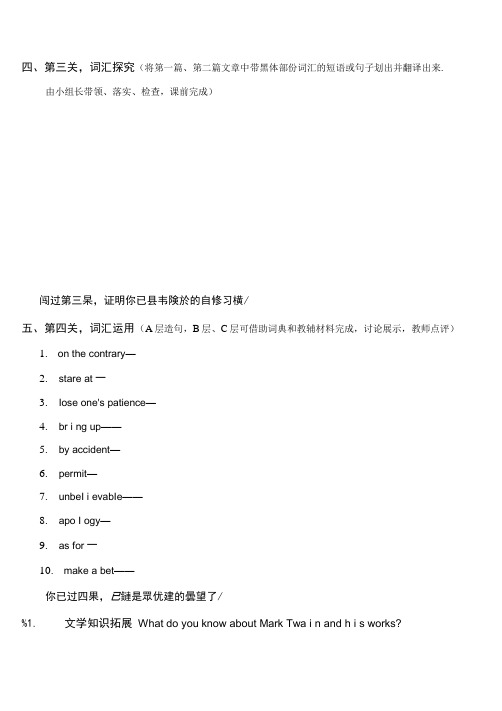
四、第三关,词汇探究(将第一篇、第二篇文章中带黑体部份词汇的短语或句子划出并翻译出来.由小组长带领、落实、检查,课前完成)闯过第三杲,证明你已县韦険於的自修习横/五、第四关,词汇运用(A层造句,B层、C层可借助词典和教辅材料完成,讨论展示,教师点评)1.on the contrary—2.stare at一3.Iose one's patience—4.br i ng up——5.by accident—6.permit—7.unbeI i evabIe——8.apo I ogy—9.as for一10.make a bet——你已过四果,已鏈是眾优建的曇望了/%1.文学知识拓展What do you know about Mark Twa i n and h i s works?Book 3 Unit31. 3. 5. 7. 9. 语 11. 13. 15. 17. ____________ v.鞠躬,弯腰____________ n. 出生地____________ n. 故障;毛病____________ v. 许可;允许____________ n. & v.冒险____________ adv. Certainly; actually____________ vt.发现 n.地点____________ n.方式;习惯 v.凝视;盯着看2. _____________ n.理发店 4. _____________ n.作者;创始人 6. _____________ n.帐目,理由 8. _____________ v.漫步,徘徊 10. ______________ n.短语,习语,惯用12. _____________ n.数量;总额 14. _____________ n.(戏)一场;场面 16. ______________ n.通道;文章18. n. 品The Million Pound Bank Note 导学案(一)——词汇闯关 编制人 王维乖 审核人: 李炜鸣 审批人:吴培峰[Introductio n 】1. Preview the new words and expressions. Memorize 30 key words2. Finish four tasks3. Be active in class activities[Learning aim 】1. Pronounce and spell the new words and expressions correctly2. Try to remember the words and expressions3. Learn to use the bold words and phrases4. Make preparations for the text.一、 优化词汇和词义(由教师提前完成)二、 第一关,拼读单词(由学生课前自学完成,附录音。
最新人教版高中英语必修三unit3 reading导学案教学内容
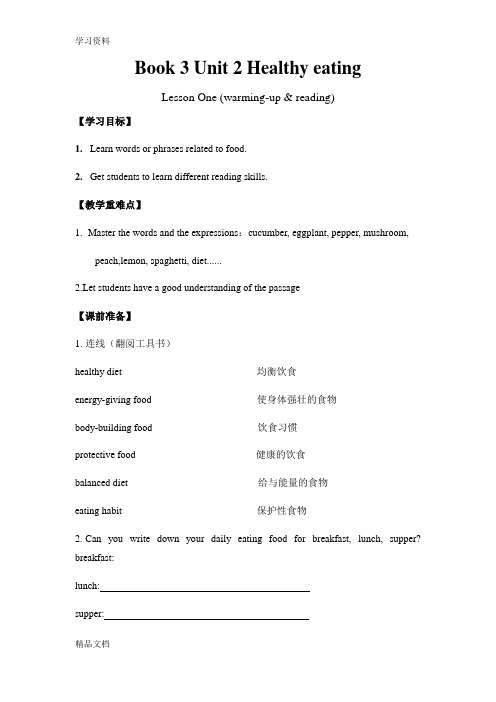
Book 3 Unit 2 Healthy eatingLesson One (warming-up & reading)【学习目标】1.Learn words or phrases related to food.2.Get students to learn different reading skills.【教学重难点】1.Master the words and the expressions:cucumber, eggplant, pepper, mushroom,peach,lemon, spaghetti, diet......2.Let students have a good understanding of the passage【课前准备】1.连线(翻阅工具书)healthy diet 均衡饮食energy-giving food 使身体强壮的食物body-building food 饮食习惯protective food 健康的饮食balanced diet 给与能量的食物eating habit 保护性食物2.Can you write down your daily eating food for breakfast, lunch, supper? breakfast:_______________________________________lunch:supper:【课堂演练】I.Warming upName the foodEnergy-giving food:Body-building food:Protective food:Specialties:II. Pre-readingLook at the title of the passage and the picture, predict what the passage is about?III. While-Readingi. Skimming:Go through the passage and find out some information.1.Who were mentioned in the text?2.Where did the story happen?3.What’s the main idea of the passage?A.Yong Hui opened a small restaurant near Wang Peng’s restaurant.B.Wang Peng visited Yong Hui’s restaurant with curiosity.C.Wang Peng found out the reason why he lost his customers and wanted to winthem back.D .Wang Peng was unhappy because people came to Yong Hui’s restaurant.ii. Scanning:1. Divided this passage into three parts and search for the main ideasPart 1( para1)Part 2( para2-3)Part 3( para4)2.True or False1.The food in Yon g Hui’s restaurant cost more than that in Wang Peng’s restaurant.( )2.Yong Hui’s menu gave customers more energy-giving food. ( )3.Wang Peng’s regular customers often became fat. ( )4.Yong Hui’s menu gave customers more emery-giving food. ( )5.Wang Peng’s menu gave customers more protective food.( )6.Wang Peng decided to compete with Yong Hui by copying her menu.( )iii. Careful reading: Choose the correct answer.1.When Wang Peng thou ght “Nothing could be better”, he meant .A.his food and drinks were the bestB.his food and drinks were the worstC.his food should have been improvedD.he could do nothing with his food and drinks2. Why did Wang Peng go into the newly-opened restaurant?A.Because he was angry.B.Because he was curious.C.Because he wanted to blame its owner.D.Because he wanted to ask for advice.3. According to the passage, we can infer that .A.Wang Peng fel t frustrated because his restaurant wasn’t full of people.B.Wang Peng was amaze d at the menu and prices in Yong Hui’s restaurant.C.Yong Hui’s menu gave customers m ore energy-giving food.D.Wang Peng foun d out Yong Hui’s restaurant served more fat than his.4.How do you think the story will end?A.FightB.ReconcileC.Close downD. win-winIV. Post-reading, summary.Wang Peng felt frustrated his customers didn’t come to his restaurant as they (usual) did.Out of (curious), he (follow) Li Chang,was his friend, to a newly-opened restaurant. He was amazed the menu and the prices. Then he went to the library (do) some research. He found that Yong Hui’s customers didn’t eat enough ener gy-giving food to keep (health). Wang Peng felt hopeful when he drove back home. Perhaps with a discount and a new sign he could win his customers .The (compete) between the two restaurants was on.V. HomeworkPrepare for the language learning and do Using Words and Expressions on Page 49 and 50.课后反思:(你在本节课学到了什么?还有哪些疑问?)。
- 1、下载文档前请自行甄别文档内容的完整性,平台不提供额外的编辑、内容补充、找答案等附加服务。
- 2、"仅部分预览"的文档,不可在线预览部分如存在完整性等问题,可反馈申请退款(可完整预览的文档不适用该条件!)。
- 3、如文档侵犯您的权益,请联系客服反馈,我们会尽快为您处理(人工客服工作时间:9:00-18:30)。
Unit 3 The Million Pound Bank Note 年级:高一科组:英语科命题人:陈冬冬
一、Analysis of the teaching material and the learners
The topic of this unit is a short story by the American author Mark Twain. It is the two rich brothers Roderick and Oliver have made a bet, about a man who could survive a month in London with million pound bank note.
The students are second-grade students of senior high of them are low foundation of reading English.
二、Teaching aims
(1)Knowledge aims:
Enable the students to understand the details about the whole scene and sum up the main idea of Act 1,Scene3.
Get the students to read the play.
(2)Ability aims:
Develop students ’s reading skills and enable them to learn how to use different reading strategies to read different reading materials.
(3)Emotional aims:
Stimulate students’interest of learning English by reading and acting this play.
Develop students’ sense of group cooperation and teamwork.
三、Important points and difficult points
Enable students to understand the details about the whole scene and act out the play.
Enable students to learn to use reading strategies such as skimming, scanning, and so on.
四、Teaching procedures
【Review】
Ⅰ.Match the word with its meaning.
birthplace A.小说
Novel B.信封
Adventure C.出生地
Author D.奇遇;冒险
Scene E.探索;寻求
wander F.著者;作家
Permit G.耐性;忍耐
Fault H.漫游;漫步;漂泊
Spot I.过错;缺点;故障
Seek J.发现;认出;斑点
Patience K.许可;允许;通行证;执照
Envelope L.(戏剧)一场;现场;场面;景色
Ⅱ.write down the meaning of the phrases in each sentence.
1.The Smiths are praised for the way they bring up their children. (抚养)
2.Go ahead for two blocks,then turn left. (前进)
3.I found the key by accident when I was cleaning the room. (偶然)
4.In the West people think it’s rude to stare at a person. (盯
着看)
5.Good luck accounts for her being famous overnight. (解释)
6. It doesn’t seen ugly to me;on the contrary, I think it’s rather beautiful.
( 相反 )
Step1 Leading in
Q1: Do you like movies
Q2 :Which movies is the picture standing for
(图略)
Step2 While—Reading
Task1:【Scanning】Read the narrator together and try to find the 4“W”.(P1)
(1)When:
(2)Where:
(3)What:
(4)Who:
Task2:【skimming 】 to the tape,underline the words you have heard and tell me what are they.(主要人物关系思维导图)(line28-34)
the background
Henry was an ___① day he had an accident in a ②_ he was survive by a ship for ③ .He arrived in London by earning his passage
without pay,He was ④in the street .To his surprise,an incredible thing ⑤ brothers gave him a million pound bank-note because they had made a ⑥ .
Task3:
1.Role play(line41-56)
think and discuss the following questions
(1)What do you think of Henry and the two brothers
㈠ For Henry:
“well, it may seen luck to you but not to me”
“If this is your idea of some kind of joke,I don’t think it’s very funny”
“Now,if you’ll excuse me, I think I’ll be on my way”
( direct/frank )“I do not want your just want an honest job” (hard-working )㈡ The two brothers
Rich:
Naughty :
Good judges of a man:
Step3 Conclusion:
Put the following event in correct order:
A、Henry wandered in London streets.
B、About a month ago Henry Adams was sailing out of the bay.
C、The next morning he was spotted by a ship.
D、Towards nightfall he found himself carried out to sea by a strong wind.
E、On the ship he earned his passage by working as an unpaid hand.。
